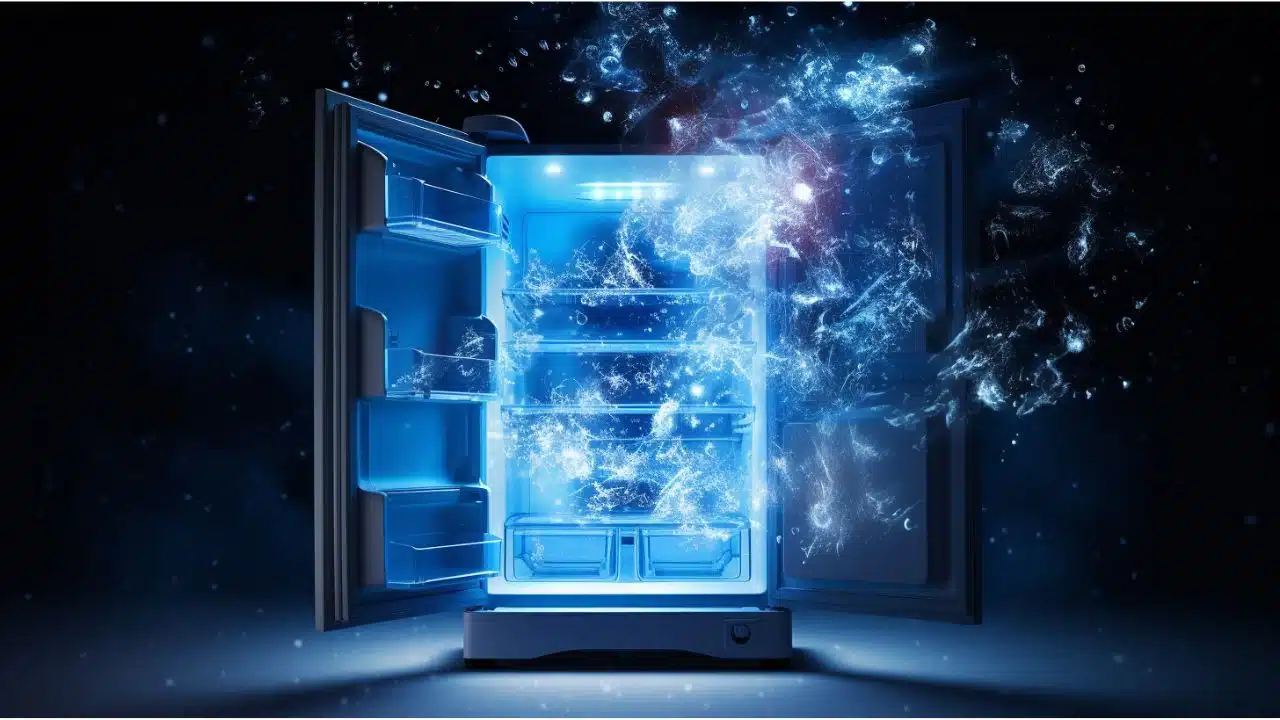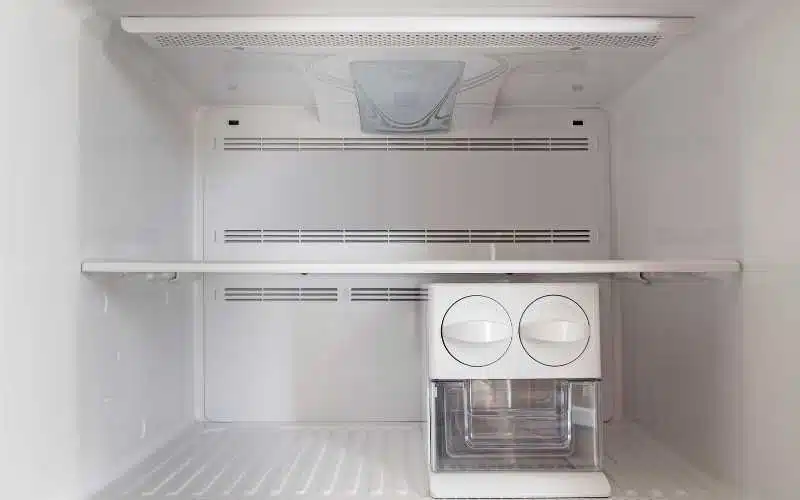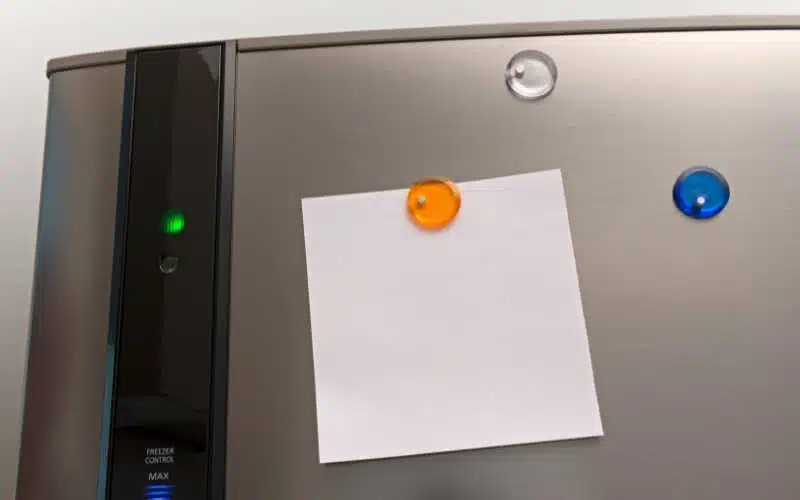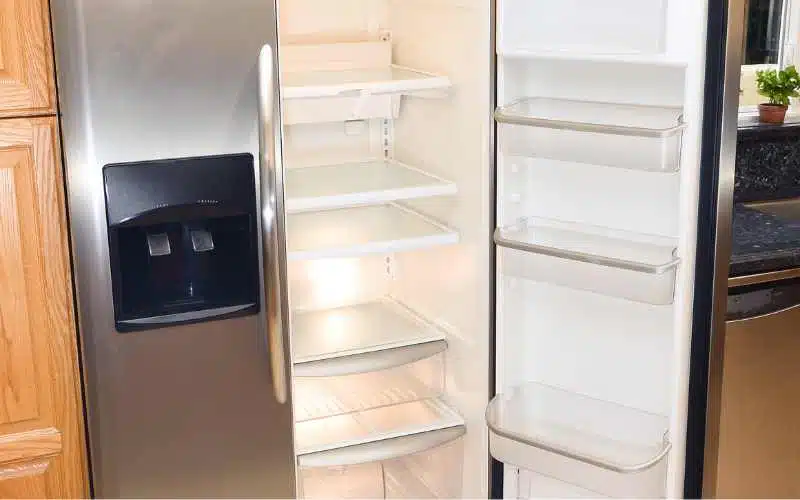General Electric refrigerators are unarguably one of the best you can get on the market. They are durable, reliable, and excellent in performance.
However, despite these pleasing attributes, they, like all machines, have their downtimes. One of these is the issue of noise.
Several complaints relating to the GE refrigerators making noise at one point or the other in their life comes up every day!
GE refrigerators make loud noises because their drain pans are loose. The drain pan is located underneath the fridge. The pan’s primary function is to collect water from the defrost system and hold it till the water evaporates from the pan. Once the pan is loose, the natural working vibration of the refrigerator shakes the loose pan, causing the noise.
GE Refrigerator Making Revving Noise?
Several users who have this issue with their GE refrigerator and reported to various technical units and experts were eventually alerted to fix their control board.
However, taking a holistic and objective view of this problem, one can only conclude that there are numerous reasons why this is occurring.
Possible causes of this problem include a faulty evaporator condenser fan trying to match its workload by switching into a high-speed mode.
This, in turn, causes other refrigerator fans to work harder than usual.
Other possible causes include a malfunctioning power control board, which sends various confusing signals to different refrigerator components or a malfunctioning fan blade motor etc.
To correctly identify the root cause of this problem, consult your manual on the steps needed to run a diagnostic mode.
Once you run the diagnostic and test mode, the system should flag any issue within the refrigerating unit by signifying an error code.
The error code flagged should be appropriately interpreted by an expert if you do not understand what the result says so that you can put an appropriate fixate as soon as possible.
Please do not take it for granted whenever you notice your GE refrigerator making weird noise of this sort!
Run the diagnostic code as soon as possible, make necessary adjustments or fixes following the error code displayed, unplug, plug the refrigerator and ensure the problem has been resolved.
If you do not restore it to its normal mode of functioning, contact an expert.
GE Refrigerator Making Loud Humming Noise?
Usually, as the icemaker fills with water, a loud humming noise is given off by GE refrigerators.
While this sound could be a familiar sound the refrigerator makes, it could also point to a problem with the ice maker.
As earlier mentioned, run the diagnostic mode on your GE refrigerator and fix the problem as indicated.
Issues of this type usually require the service of an expert. The ice maker must be replaced or serviced.
Once the ice maker has been certified to be working correctly and the expert has duly examined other related parts, you need not worry about the sound.
It might just be the refrigerating system’s method of coping with its workload.
GE Refrigerator Making Loud Buzzing Noise?
This weird noise can be attributed to either the refrigerator’s compressor or the water dispenser. The GE refrigerator compressor noise often comes off as a low buzzing sound.
While this is normal, this type of sound frequently calls for attention.
Thus, ensure you run a diagnostic mode scan and inform your supplier or technician about the problem when this keeps happening.
In some cases, however, the buzzing sounds from GE refrigerators are pretty normal, as they come from the water inlet valve or the ice maker.
While the ice maker is being filled with water, various combinations of sounds are usually given off.
This buzzing sound occurs about every hour or one and a half hours while the ice maker is filled with water.
It could also occur whenever the ice maker is turned on and the water inlet valve is turned off; here, the buzzing sound occurs approximately every 15 minutes.
On XWF filter models, a buzzing sound for five seconds per hour may occur. This has been identified to be due to an isolation valve issue.
So, the valve helps to prevent significant leaks from the refrigerator.
Furthermore, the root cause of this problem might be a loose fan blade or a condenser fan failure.
Therefore, do not take this sound lightly whenever you notice this sound emanating from your refrigerator.
GE Refrigerator Making Clicking Noise?
This also, just like a headache in the human body, is a significant pointer towards a possible problem; in this case the ice maker failure.
Furthermore, this sound from refrigerators, particularly GE profile refrigerators, indicates either one or more of the following issues: disconnection from the water supply, mainboard, and control board malfunction, or a malfunctioning start relay.
After proper technical examination by an expert, if the problem is not coming from one or more of the above-listed issues, the clicking sound is likely only a part of the regular operation of the refrigerator.
Since it was not there from the beginning, it is expected that the clicking sound would eventually fade away on its own after some time.
Now, let us look at each of the problems contributing to this issue.
#1. Faulty Starter Relay
The compressor houses the relay. The clicking sound is given off when the relay starts the compressor.
However, the sound does not persist after the compressor has been successfully switched on.
If the sound keeps being repeated by the refrigerator and the compressor is not responding, you must change the compressor.
#2. Water Inlet Valve
This valve supplies water to the ice maker and the water dispenser. Once these two components have requested water, the water inlet valve snaps open with a clicking sound.
However, if the water inlet valve opens and no water source is connected to deliver the required water, the sound becomes more persistent and louder.
#3. Mainboard / Primary Control Board
A clicking sound happens once any malfunction hits this critical component. Replace the control board.
If the above issues are not the cause of the clicking sound (particularly at the back panel of the refrigerator), then the clocking could be a sign of a proper fit.
GE Refrigerator Making Intermittent Buzzing Noise?
As earlier pointed out, whenever a GE refrigerator makes a weird noise, it most likely comes from the water inlet valve or water dispenser.
To prevent this or stop it from happening, turn off the water source if there is a water supply.
However, if you cannot turn it off, empty the water tank and ensure there is none left to supply the ice maker.
As the ice maker or water dispenser requests water from the empty source that fails to supply, the request degenerates into a buzzing noise, which persists until the water supply reaches the ice maker or water dispenser.
Failure in this regard means the sound would continue indefinitely.
GE Refrigerator Making Grinding Noise?
This might be due to a faulty evaporator fan motor or a faulty condenser fan motor that is usually at the refrigerator’s back and lower access panel.
A defective evaporator motor fan blade can also create these grinding noises in your GE refrigerator.
Inspect the condenser motor fan blade for cracks and foreign materials.
Also, the door closure cams, either at the top or bottom parts of the door, might have failed to cushion the friction caused by opening the refrigerator door.
Also, faulty water inlet valves (ensure you turn on the water source entirely, engage the technician’s service to replace solenoids and other parts of the water inlet valve if you notice the sound coming from there).
Finally, dusty condenser coils make the compressor and other refrigerator features work much harder than they should.
A grinding sound is one of the refrigerating system’s signals under this kind of stress.
Furthermore, you might need to engage the technician’s service if the sound persists after cleaning the compressor coils and checking the water supply to be in perfect condition.
GE Refrigerator Making Loud Pulsating Noise?
The evaporator condenser fan is covered by dirt. The dirt covering makes heat conduction from the refrigerator’s interior to the exterior quite tricky.
Thus, to get rid of this pulsating noise, it is advised that you clean the evaporator condenser fan regularly. Keep the evaporator free from dirt and dust!
Apart from preventing or fixing this pulsating noise, it also helps reduce the amount of power consumed by your refrigerator.
GE Refrigerator Making Loud Squealing Noise?
This problem usually results from an accumulation of dust on the compressor condenser coils, creating a noisy refrigerator compressor!
This is quite a common problem in tropical regions, and it is so because of the dry winds and dusty environment that characterizes those regions.
The evaporating coils at the back of General Electric refrigerators are responsible for conducting heat away from the fridge’s interior to dissipate the heat to the environment through the compressor’s condenser coils.
Thus, this disturbing sound could be attributed to a noisy refrigerator compressor that results from dusty and dust-insulated compressor condenser coils.
The compressor condenser coils are located at the lower access panel of the GE refrigerators.
You should note that the presence of dust or other forms of dirt on the compressor condenser coils does not only cause the refrigerator to produce a weird noise.
This phenomenon also forces and places much demand on the compressor itself and the condenser fan blade to work much harder than they were meant to.
Hence, the condenser fan motor and the compressor condenser coils are at risk of breaking down simultaneously or at short intervals.
This occurrence is problematic because it clogs the condenser fan motor and prevents it from playing its role.
If you do not handle the problem swiftly, it will result in total damage to the fan motor.
To clean the compressor condenser coils at the lower access panels of GE refrigerators by yourself, use a vacuum cleaner and other soft cleaning materials you can lay hands on to facilitate the cleaning process.
Note that the condenser coils are pretty fragile, so always handle them with care.
Before embarking on this cleaning project, ensure that the GE refrigerator has been unplugged the fridge and allowed to cool down.
This would give you enough room to clean the refrigerator properly.
Conclusion
The significant reasons GE electric refrigerators start making loud noises are dirt, dust, and damage to the evaporator fan motor.
Also, faults in the condenser fan motor, evaporator motor fan blade, condenser motor blade, and a faulty compressor are added to this situation.
To prevent or solve this problem, always ensure to properly dust the essential components mentioned in this article, particularly the condenser coils.
If the problem persists, engage the service of an expert to diagnose and fix the noise issue properly.





